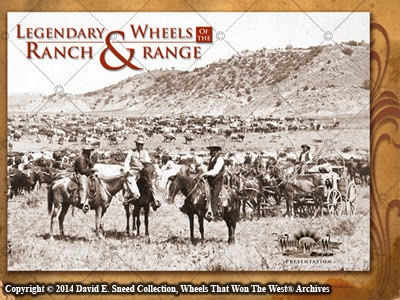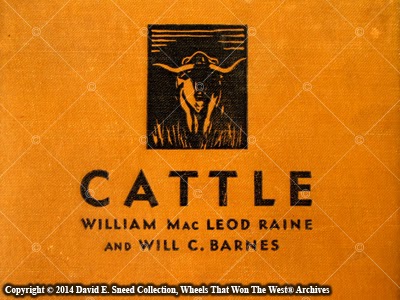One of my greatest weaknesses has always been books. These prodigious keepers of knowledge can open new worlds of discovery and intrigue. As an example, last week I was going through the ranch vehicle section of our library. In the process, I came across a first edition book I had purchased years ago. The name of the volume is Cattle. It was published in 1930 and written by Will C. Barnes and William MacLeod Raines. The book is signed by Mr. Raines and includes a few other written notations. It's a fascinating piece with details about the early Texas cattle industry, cowboys, trails, towns, round-ups, wagons, outlaws, rustling, brands, and so forth.
To the point, though; what I had forgotten is that inside this specific book is a 2-page, signed letter from one of the authors, Will C. Barnes. It was written to a friend, over 80 years ago, just as Cattle was being released to the public. The letter references the new book and outlines several of Mr. Barnes' recollections along with news from his recent travels to Phoenix, Los Angeles, and Panama. History has always captivated me and this letter did even more. As I read through the aged correspondence, the thoughts of this roughly 72-year-old gentleman and the fullness of his experience in the American West hit me. In 1880, Mr. Barnes was a private in the U.S. Military. He had accomplished much at an early age and had just been assigned as a telegrapher to Fort Apache in Arizona. The West faced many challenges and hostilities during this timeframe. By August and September of 1881, there were a number of armed engagements with Apache forces. During one of those incidents, PVT Barnes escaped the fort to find help. Because of his exemplary record and bravery, he was awarded the Congressional Medal of Honor in 1883. Other credits among his wide-ranging attributes include service in the Arizona Territorial Legislature, U.S. Forest Service grazing program, and U.S. Geographic Board. He is also recognized for helping preserve the legendary Texas Longhorn.
A lengthy but rousing report of Mr.Barnes' background and experiences at Ft. Apache during the early 1880's can be found at this U.S. Army site. While much of the account on this site offers straight-forward and interesting details of life in the Old West, I appreciated the stressful humor and poor luck in the following paragraph about Mr. Barnes...
"Traveling in Arizona in 1883 was not for the weak and faint-hearted, particularly in bad weather. For example, after reaching Holbrook and setting off for his ranch, Barnes found what must have been the Little Colorado on a "big boom" from the previous night's rain. In trying to cross it, his horse went under and Barnes swam out to save himself, only to find that he was on the wrong side of the river, whereupon he was obliged to swim back to the other side."
One of a number of books written by Mr.Barnes, Cattle was published during a time when, by his own admission, "...hundreds of men are still living who followed the dust of the drag in the long northbound treks." * As such, it offers a unique perspective in helping visualize the era.

So, what does all of this have to do with western vehicles? Beyond a few morsels of wheeled information within the book, this look into yesteryear (by those who were there) is an additional reminder that truly appreciating western vehicles requires a thorough understanding of the environment and times in which they were used. After all, the details and features of every set of wheels is a direct result of the demands placed upon it.
Cattle paints a vivid picture of Texas cattle drives as well as the legendary cowboy's effect on the American West. On a broader note, this historic knowledge has a way of bringing folks together on even more common ground; recognizing the struggles of people and place while honoring the challenges of personal hardships and celebrating the overall experience of life. While there are numerous groups dedicated to promoting this part of our western heritage, perhaps none is more focused than the American Chuck Wagon Association. We're proud to be a participating member of this great group of folks and, through our Archives are committed to helping preserve the wheeled history that built such a powerful legacy in America. Ultimately, it's a story as big as our nation and as timeless as the spirit of the West.
* Cattle, page 7
